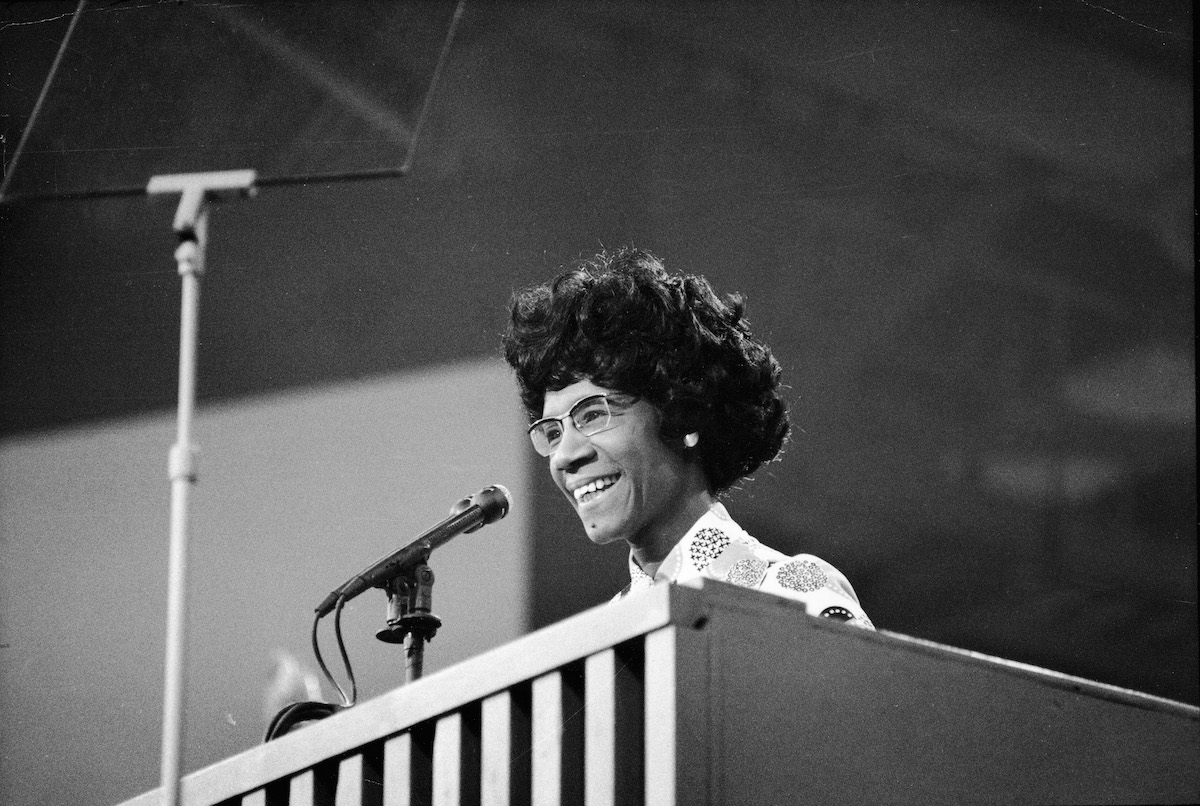
In 1970, Shirley Chisholm wrote a letter—a scathing one. In it, she demanded that Edgar Berman, a physician and friend of former Vice President Hubert Humphrey who was on the Democratic Party’s platform committee, resign. During a committee meeting, Berman had argued that women could never be effective presidential leaders because of their menstrual cycles.
“Suppose that we had a menopausal woman President who had to make the decision of the Bay of Pigs or the Russian contretemps with Cuba?” asked Berman, adding that a female president might be “subject to the curious mental aberrations of that age group.”
Less than two years later, undeterred by rhetoric like Berman’s, Chisholm announced her bid for the presidency. Her slogan? “Unbought and unbossed.” The first woman to mount a major bid for the Democratic Party’s nomination, Chisholm faced a war of words as she tried to convince the nation that she was fit to serve as its executive in chief. Forty-four years later, as Hillary Clinton clinches the Democratic Party’s nomination, here are a few times people told Chisholm she didn’t stand a chance:
“It’s an exercise in rhetoric.”
In an article in the Wall Street Journal on Feb. 14, 1972, Norman C. Miller interviewed several unnamed politicians about Chisholm’s run. He called her run “quixotic,” stating that “few politicians, black or white, believe it.” Though Chisholm spoke out in favor of women’s rights, her speeches emphasized civil rights for black voters, too—which Miller saw as an anomaly in a time of candidates who usually pandered to a single demographic.
“On the campaign trail, Mrs. Chisolm’s women’s lib rhetoric is hardly calculated to soothe the wounded feelings of black male politicians,” Miller wrote. Chisholm’s response? “I’m looking to no man walking this earth for approval of what I’m doing.”
Get your history fix in one place: sign up for the weekly TIME History newsletter
“This is just ego tripping…she won’t last six weeks.”
The same piece quoted an unnamed politician who claimed that Chisholm’s run was a mere ego trip and that she could never exert influence on the political process. “Many people did not realize I was a serious candidate,” recalled Chisholm after her campaign was over. “But in the end, they realized there was something to what I was saying.”
“She’s playing ‘vaginal politics.’”
In an editorial in the Chicago Daily Defender,” Louis Martin quoted men who accused Chisholm of playing “vaginal politics” to piggyback off of the success of the women’s rights movement. Though she did gain some support from major feminist figures, like Bella Abzug, Chisholm fought to distinguish herself from the movement throughout her run. Not that it helped—one piece by Andrew Tully mourned that “We are, I fear, doomed to an era of female meddling in the electoral process.” Besides, he noted, Chisholm “doesn’t have a chance at top banana, of course.”
MORE: 5 Other Women Who Ran For President
“She speaks with an engaging lisp.”
A 1972 piece in the Oakland Post previewing Chisholm’s run for president paid more attention to her physical attributes than her campaign promises. The author pointed out that “Mrs. Chisholm…speaks with an engaging lisp” and noted that she was “diminutive and short in knee-high laceup boots.” Chisholm’s appearance, height, and even weight were fair game during the campaign.
Though the odds were stacked against her, Chisholm’s campaign lasted up to the Democratic National Convention. There, she won 152 delegates—and lost her nomination bid. Chisholm didn’t live to see Clinton’s accomplishment; she died in 2005. But Clinton’s achievement is due, at least in part, to the door that Chisholm wedged open during her historic run. As she put it when asked why she was running, she wanted to “repudiate the ridiculous notion that the American people will not vote for a qualified candidate simply because he is not white or because she is not male.”
“We must reject not only the stereotypes that others have of us,” Chisholm once said, “but also those that we have of ourselves.” And at least one stereotype is now firmly put to rest: no matter what you think of the candidates, it’s impossible to deny that a woman can make a legitimate presidential bid.
More Must-Reads from TIME
- Why Trump’s Message Worked on Latino Men
- What Trump’s Win Could Mean for Housing
- The 100 Must-Read Books of 2024
- Sleep Doctors Share the 1 Tip That’s Changed Their Lives
- Column: Let’s Bring Back Romance
- What It’s Like to Have Long COVID As a Kid
- FX’s Say Nothing Is the Must-Watch Political Thriller of 2024
- Merle Bombardieri Is Helping People Make the Baby Decision
Contact us at letters@time.com